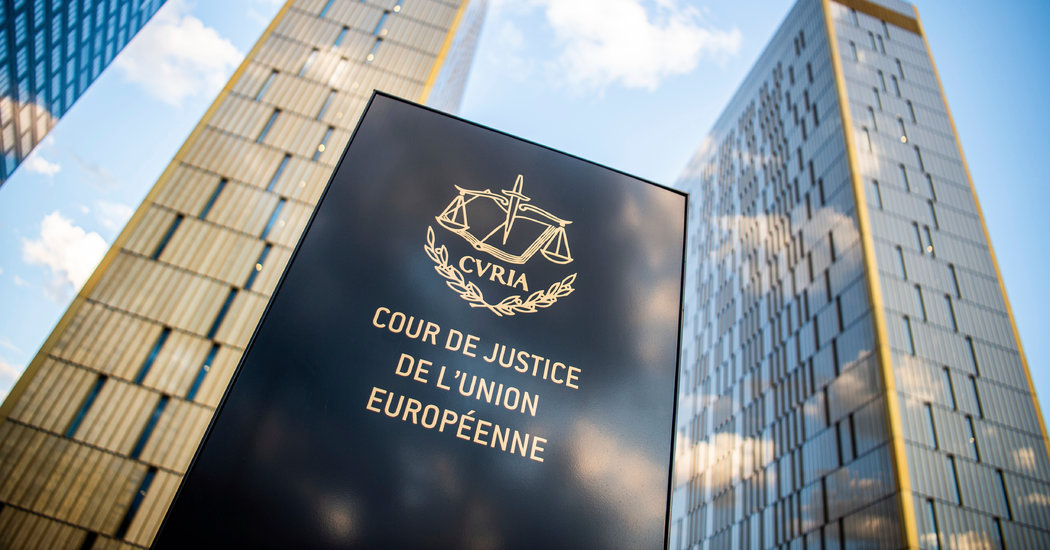LONDON — Europe’s prime court explained on Thursday that an personal nation can purchase Fb to just take down posts, images and videos and limit global accessibility to that product, in a ruling that has implications for how international locations can increase content material bans beyond their borders.
The European Court docket of Justice’s final decision arrived after a former Austrian politician sought to have Facebook take out disparaging remarks about her that experienced been posted on an individual’s personal web site, as perfectly as “equivalent” messages posted by other people. The politician, Eva Glawischnig-Piesczek, a former leader of Austria’s Green Bash, argued that Facebook essential to delete the materials in the country and restrict all over the world access.
The final decision is a blow to massive world-wide-web platforms like Fb, inserting extra obligation on them to patrol their internet sites for content material dominated illegal.
The circumstance has been carefully viewed since of its potential ripple effects for regulating web material. The enforcement of defamation, libel and privacy laws may differ from nation to region, with language and actions that is allowed in 1 nation prohibited in one more. The court’s final decision highlights the difficulty of generating uniform standards to govern an inherently borderless web and then implementing them.
Fb and other critics experienced warned, just before the final decision, that allowing a single nation force an web system to delete materials in other places would limit free of charge speech. Employing these a world wide ban would likely call for the use of automatic articles filters, which civil modern society groups and other folks have cautioned could guide to the takedown of genuine materials for the reason that filters simply cannot detect nuances utilized in satire and some political commentary.
Opponents had also argued that allowing the elimination of an authentic put up and then expanding that ban to posts regarded as “equivalent” included some likely for unintended outcomes.
Supporters counter that defamation legislation haven’t been enforced appropriately in the online age and are desired to drive platforms like Facebook to do additional to overcome online trolls, hate speech and other individual assaults that unfold on the internet.
Facebook sharply criticized the ruling. “This judgment raises vital inquiries all around freedom of expression and the purpose that online corporations need to engage in in monitoring, decoding and removing speech that may well be unlawful in any particular country,” the enterprise mentioned in a statement.
“It undermines the longstanding basic principle that 1 place does not have the correct to impose its legal guidelines on speech on an additional state. It also opens the doorway to obligations getting imposed on web corporations to proactively monitor content material and then interpret if it is ‘equivalent’ to articles that has been uncovered to be illegal.”
As Europe has enacted harder procedures on privacy and world-wide-web content, courts are becoming asked to make clear their access, including if Fb, Google and other platforms must apply the guidelines over and above the borders of the 28-country European Union.
On Thursday, the Luxembourg-primarily based courtroom turned its notice to the reach of European defamation rules. It ruled that a national courtroom of a European Union country could order Fb to take away posts viewed as defamatory in locations further than its jurisdiction.
The difference among today’s determination and very last week’s ruling restricting the achieve of the proper to be overlooked is that an Austrian court had precisely identified, in its determination, that the offensive reviews toward Ms. Glawischnig-Piesczek have been illegal.
The court on Thursday explained that when Fb wasn’t liable for the disparaging comments posted about Ms. Glawischnig-Piesczek, it had an obligation to get down the posts immediately after a courtroom dominated them unlawful. Fb, the court docket reported, “did not act expeditiously to take out or to disable access to that info.”
“The important issue about this scenario is what preventive actions can be imposed on Fb,” explained Martin Husovec, an assistant regulation professor at Tilburg University’s Institute for Regulation, Technologies and Culture in the Netherlands.
The court’s choice are unable to be appealed.
Facebook has extended said it is an neutral system and argued that it really should not be held lawfully accountable for materials posted by its much more than 2 billion buyers. Nevertheless with greater scrutiny from policymakers close to the environment, the social community has taken actions to limit dislike speech and extremism on its website. Previous month, it appointed an 11-member oversight board to critique written content decisions.
The European Courtroom of Justice conclusion was rooted in gatherings from 2016, when a Fb user in Austria posted a connection to a news write-up about immigration that included remarks calling Ms. Glawischnig-Piesczek a “lousy traitor of the men and women,” a “corrupt oaf” and member of a “fascist occasion.”
Fb at first refused requires to take out the content. In several countries the opinions would be thought of suitable, if vulgar, political speech.
Ms. Glawischnig-Piesczek properly sued Facebook in Austrian courts, which concluded the comments had been meant to harm her track record. She also demanded that Facebook clear away posts that had been similar in tone to the authentic insults.
The Austrian Supreme Court docket referred the situation to the European Courtroom of Justice.
